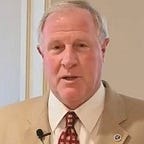Are You Willing to “Win” at All Costs?
Growing up, I relished playing competitive sports. Wrestling and football were major passions of mine, and I loved the famous quote, “Winning isn’t everything; it’s the only thing” which is widely, but wrongly attributed to American football coach Vince Lombardi. It was actually first spoken by UCLA Bruins football coach Henry Russell (“Red”) Sanders in the 1930s. The quotation captured the American public’s attention during Lombardi’s highly successful reign as coach of the Packers in the 1960s. Over time, the quotation took on a life of its own and graced the walls of locker rooms, ignited pre-game pep talks, and was even used in the presidential campaign of Richard Nixon.
After entering the business world, initially as a sales person and later as a VP of Sales in four different companies, I subscribed whole-heartedly to the “winning is the only thing” mentality. I found it motivating but later realized it’s not true. It’s how we win that matters At what cost are we willing to “win”? Who do we have to step on or over to succeed? In the long run is this win/lose zero sum battle really the best way to make a living? Does it really serve anyone in a good way? I think not.
For some sales people the interaction with a prospect is a battle that is either won or lost. Using well-worn and often rehearsed sales pitches loaded with jargon, a seasoned sales person can effectively manipulate a prospect and in essence back verbally them into a corner where they basically have to say yes to the “offer”. It is analogous to a veteran trail attorney asking a witness a series of questions she knows the answers to and concluding with something like “So, Mr. Jackson the fact is that you really can’t say with certainty that my client was present that day, isn’t that correct?” Sales trainers for years would advocate getting several consecutive “yeses”, to almost anything, in order to condition the prospect before going for the close: “So, Ms. Lewis, this product meets all of your needs and represents a great value, wouldn’t you agree?” Followed by “Will you be paying with cash or with credit card?” This is the “either or” close.
The best, most-successful sales professionals develop long-term, trust-based relationships with clients by acting with integrity at all times and focusing on what the client needs and wants. They never stoop to using manipulative practices, half-truths or lies. They also never take advantage of someone’s emotional state or exploit another’s vulnerability in any manner. These folks hold their head high, sleep well, and are proud to call themselves a sales professional.
